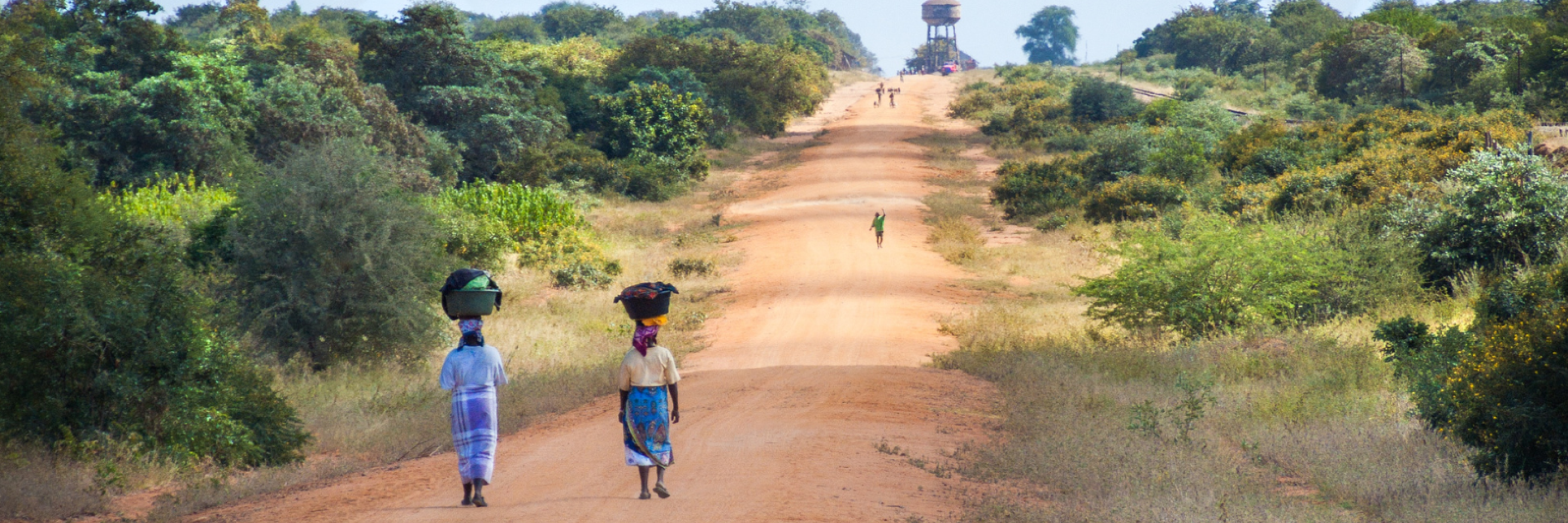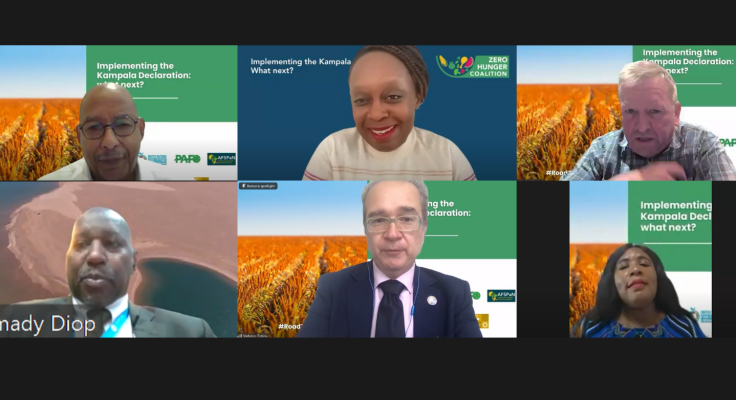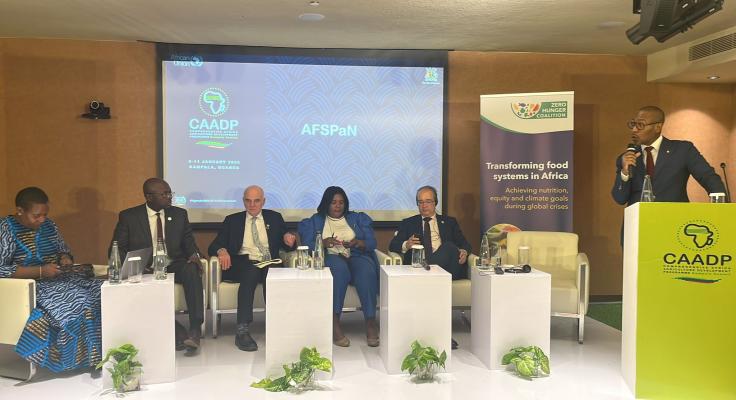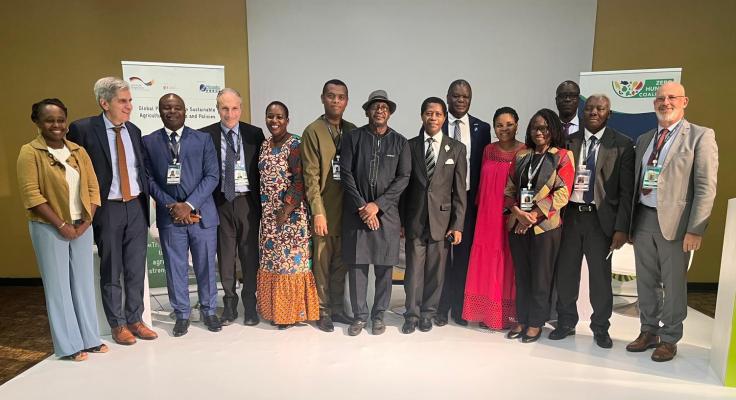
Parliamentary leadership in action: implementing the Post-Malabo strategy for resilient and inclusive agrifood systems
The African Food Systems Parliamentary Network is organising a side event in partnership with the Zero Hunger Coalition, the African Union Commission, AGRA, the Pan-African Parliament, Policy LINK, CARE, ActionAid, TrustAfrica, Oxfam in Africa, SDG2 Advocacy Hub, Shamba Centre for Food & Climate. The event will take place on Friday, 10 January, from 3 to 4:30 pm EAT (1pm CET) in the Bujagali Hall, Speke Resort, Kampala, Uganda, as part of the Extraordinary African Union Summit on the Post-Malabo Comprehensive Africa Agriculture Development Programme (CAADP).
Africa's agrifood systems are essential to the continent's economic and social fabric, contributing approximately 23% of GDP and employing about 60% of the workforce. In sub-Saharan Africa, smallholder farmers are pivotal, managing around 80% of the farmland and forming the backbone of food production systems. Despite this significance, the sector faces severe challenges that threaten its sustainability and the continent’s food security.
Africa remains heavily dependent on food imports, which amounted to $43 billion in 2019 and are projected to rise to $110 billion by 2025 if no action is taken. This reliance on imports undermines local food sovereignty and not only drains foreign reserves but also undermines local food sovereignty, exposing domestic markets to global price fluctuations and supply chain disruptions.
Meanwhile, public investment in agriculture remains critically low, with many African countries falling short of the Malabo Declaration's target of allocating at least 10% of their annual budgets to the sector. This chronic underinvestment exacerbates structural inefficiencies, leaving agrifood systems ill-equipped to address growing food demand and increasingly severe climate shocks.
For agrifood systems to take a holistic approach, they must encompass the interconnected processes, actors, and policies involved in food production, distribution, consumption, and waste management. This approach recognizes the complex interdependencies within these systems and highlights the need for integrated strategies that align actions at local, national, and regional levels to promote sustainability, equity, and resilience.
However, policy fragmentation remains a significant barrier to realizing the full potential of this approach. Disjointed strategies across governance levels hinder coordinated efforts to address systemic challenges such as trade barriers, inadequate infrastructure, and gaps in value chain integration. These fragmented efforts prevent agrifood systems from leveraging opportunities like intra-African trade and regional market expansion, leaving much of their transformative potential untapped, impeding progress toward food security and sustainable economic growth. Addressing this fragmentation is critical to realizing the transformative potential of a fabric food system in Africa.
The Post-Malabo Strategy and Action Plan (2026–2035) offers a transformative framework to address these systemic barriers and unlock the potential of agrifood systems across Africa. It emphasizes inclusivity, resilience, and sustainability as core principles, recognizing the need to integrate smallholder farmers, women, and youth into value chains and governance. This strategy prioritizes evidence-based decision-making, mutual accountability, and the harmonization of trade policies to foster intra-African trade and regional integration. The CAADP Biennial Review serves as a critical tool for monitoring progress and ensuring coordinated implementation among member states.
Parliamentarians are pivotal in advancing the Post-Malabo Strategy. They craft enabling policies that align with the strategy’s goals, including promoting climate-smart agriculture, supporting indigenous crops, and fostering regional trade agreements. Through their budgetary oversight, parliamentarians ensure increased investments in agrifood systems, prioritizing resilience and inclusivity. They also play a watchdog role, monitoring implementation to ensure that government actions align with CAADP principles.
Importantly, parliamentarians bridge the gap between local, national, and regional priorities. Their leadership fosters cohesion across stakeholders, breaking down silos and ensuring collaboration between governments, civil society, and the private sector. By advocating for inclusive governance structures, parliamentarians amplify the voices of marginalized groups, including women and youth, fostering equitable and sustainable development.
#RoadToKampala
The event will be webstreamed
AGENDA
Speakers:
- Hon. Jeremy Lissouba, Secretary General, African Food Systems Parliamentary Network (AFSPaN)
- Hon. Chief Fortune Zephania Charumbira, President of the Pan-African Parliament (PAP)
- Paul Valentin Ngobo, Minister of Agriculture, Livestock, and Fisheries, Republic of the Congo
- Dr. Ibrahima Coulibaly, Chairperson, Pan-African Farmers’ Organization (PAFO)
- Dr Dora Siliya, former Minister of Agriculture, former Member of Parliament in Zambia, and member of the AFSPaN
- Stefanos Fotiou, Director of the UN Systems Food Coordination Hub
- Hon. Neema Lugangira, Member of Parliament in Tanzania and member of the AFSPaN
- Sir David Nabarro, Strategic Director, 4SD Foundation
- Hon. Dr. Godfred Seidu Jasaw, Chairperson of the AFSPaN



